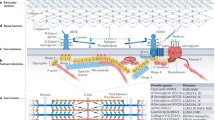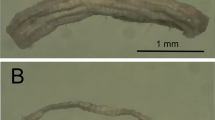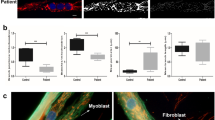Abstract
Duchenne muscular dystrophy (DMD) is a debilitating X-linked muscle disease. We have used sequence information from complementary DNA clones, derived from the gene that is deleted in DMD patients1–3, to generate an antiserum that stains the surface membrane of intact human and mouse skeletal muscle, but not that of DMD patients and mdx mice4. Here we identify the protein reacting with this antiserum as a single component of relative molecular mass 210,000 (Mr = 210K) that fractionates with a low-ionic strength extract of intact human and mouse skeletal muscle. It is therefore distinct from the 400K protein found in the heavy microsomal fraction of normal muscle and identified as a putative product of the DMD gene5. We also analyse further the disease specificity of the antiserum. Positive staining is seen in normal controls, and in samples from patients with a wide range of muscular dystrophies other than DMD. Becker muscular dystrophy6, which is allelically related to DMD, was the only other exception, and gave a sporadic staining pattern. The demonstration of a specific defect in the surface membrane of DMD muscle fibres substantiates the hypothesis7–10 that membrane lesions may initiate muscle degradation in DMD.
This is a preview of subscription content, access via your institution
Access options
Subscribe to this journal
Receive 51 print issues and online access
$199.00 per year
only $3.90 per issue
Buy this article
- Purchase on Springer Link
- Instant access to full article PDF
Prices may be subject to local taxes which are calculated during checkout
Similar content being viewed by others
References
Monaco, A. P. et al. Nature 323, 646–650 (1986).
Koenig, M. et al. Cell 50, 509–517 (1987).
Hoffman, E. P., Monaco, A. P., Feener, C. C. & Kunkel, L. M. Science 238, 347–350 (1987).
Sugita, H. et al. Proc. Japan Acad. 64, 210–212 (1988).
Hoffman, E. P., Knudson, C. M., Cambell, K. P. & Kunkel, L. M. Nature 330, 754–758 (1987).
Kingston, H. M. et al. Lancet ii, 1200 (1983).
Mokri, B. & Engel, A. G. Neurology (Minneapolis) 25, 1111–1120 (1975).
Schmalbruch, H. Acta neuropath., Berlin 33, 129–141 (1975).
Carpenter, S. & Karpati, G. Brain 102, 147–161 (1979).
Sugita, H. & Toyokura, Y. Proc. Japan Acad. 52, 260–263 (1976).
Hodgson, S. et al. Hum. Genet. 74, 409–416 (1986).
Nudel, U., Robzyk, K. & Yaffe, D. Nature 331, 635–638 (1988).
Ebashi, S., Toyokura, Y. & Sugita, H. J. Biochem., Tokyo 46, 103–104 (1959).
Hoffman, E. P., Brown, R. H. Jr., & Kunkel, L. M. Cell 51, 919–928 (1987).
Arahata, K. & Engel, A. G. Ann. Neurol. 16, 193–208 (1984).
Author information
Authors and Affiliations
Rights and permissions
About this article
Cite this article
Arahata, K., Ishiura, S., Ishiguro, T. et al. Immunostaining of skeletal and cardiac muscle surface membrane with antibody against Duchenne muscular dystrophy peptide. Nature 333, 861–863 (1988). https://doi.org/10.1038/333861a0
Received:
Accepted:
Issue Date:
DOI: https://doi.org/10.1038/333861a0
This article is cited by
-
Myocardial late gadolinium enhancement is associated with clinical presentation in Duchenne muscular dystrophy carriers
Journal of Cardiovascular Magnetic Resonance (2016)
-
Dystrophin deficiency reduces atherosclerotic plaque development in ApoE-null mice
Scientific Reports (2015)
-
The l-arginine/NO pathway and homoarginine are altered in Duchenne muscular dystrophy and improved by glucocorticoids
Amino Acids (2015)
-
Stem cells from umbilical cord blood do have myogenic potential, with and without differentiation induction in vitro
Journal of Translational Medicine (2009)
-
Diagnosis and cell-based therapy for Duchenne muscular dystrophy in humans, mice, and zebrafish
Journal of Human Genetics (2006)
Comments
By submitting a comment you agree to abide by our Terms and Community Guidelines. If you find something abusive or that does not comply with our terms or guidelines please flag it as inappropriate.



